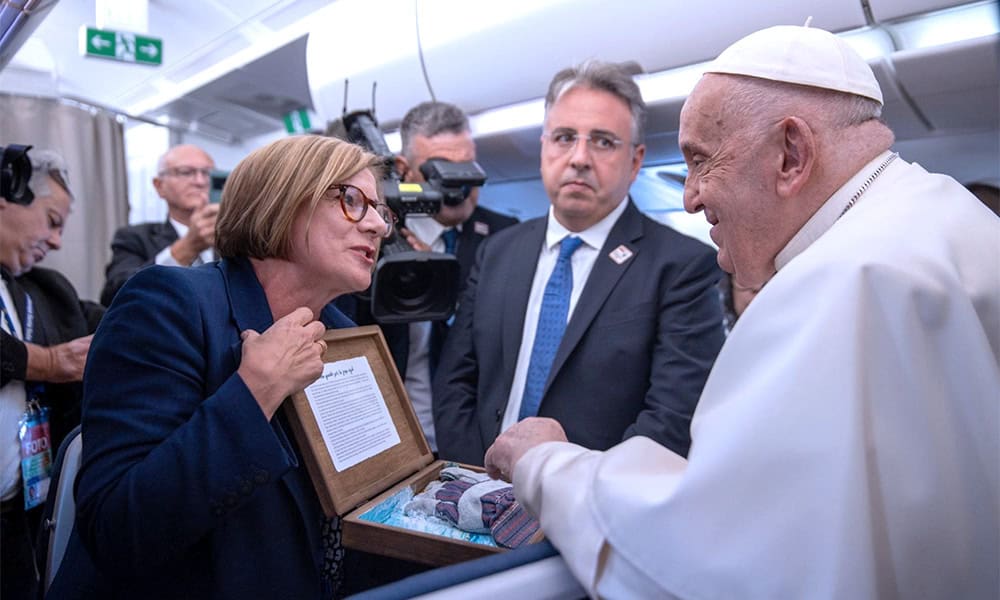During his flight to Indonesia, Pope Francis greeted journalists and received several gifts, including a glove from a young Costa Rican Catholic who has been dedicated to cleaning and collecting garbage from the country’s beaches, contributing significantly to environmental conservation.
Eva Fernández, a journalist from Spain’s COPE network, presented the gift to Pope Francis. She explained that the glove was intended to remind the Pope of Costa Rica’s commitment to environmental protection, particularly as he prepares to visit countries where plastic pollution in the waters is a major issue.
“When our team considered sending the Pope a gesture related to nature conservation and the biodiversity that characterizes our country, we decided on a glove from a volunteer—one of the many who clean rivers and beaches in Costa Rica. We placed it in a small wooden box, accompanied by some of the garbage collected from the beaches as a symbolic gesture, with Costa Rican artist Paula Sáenz painting the sea and overseeing the final touches,” said Lisandra Chaves, Executive Secretary of Communication for the Episcopal Conference of Costa Rica.
The glove was donated by Fabián Leandro, representing the many Costa Rican volunteers dedicated to preserving the environment, particularly through beach and river cleanups. The gift was accompanied by an explanation highlighting Costa Rica’s marine richness.
A Glove for the Blue Jewel
Costa Rica is a marine-rich country, with 51,030 km² of land and 572,877 km² of marine area, meaning 92% of the nation is sea. Beneath these waters lie several seamounts and the longest volcanic mountain range in the country, the Cordillera Submarina del Coco, which extends approximately 800 km. Costa Rica boasts the highest density of biodiversity in the world.
Costa Rica’s marine area borders four countries: Nicaragua, Panama, Ecuador, and Colombia. The region is home to 3.5% of the world’s marine biodiversity, with 6,700 marine species identified, 90 of which are endemic, making it a precious “blue jewel.”
The oceans are a critical source of food, producing more than 50% of the oxygen we breathe and capturing 30% of the carbon dioxide emissions produced over the last 200 years.
Thousands of volunteers in Costa Rica regularly participate in cleanup efforts across different parts of the country, including the North Pacific, Central Valley, Central Pacific, and Caribbean regions. Many local organizations and companies unite to combat single-use plastic pollution on beaches, rivers, parks, and ultimately, the oceans surrounding Costa Rica.
During these cleanup efforts, more than 20 tons of waste can be collected. The initiative also aims to raise awareness about plastic use and disposal.
This work glove belonged to one of those thousands of volunteers, Fabián Leandro, a young Catholic who used it to clean and collect garbage from Costa Rican beaches.
Costa Rica has a significant number of volunteers dedicated to cleaning up garbage from rivers and beaches. It is estimated that only 19.9% of discarded plastic is recycled, and by 2050, there could be more plastic than fish in the oceans. This glove symbolizes all the people dedicated to caring for the environment, working to preserve Costa Rica’s natural treasures, and preventing further contamination of our seas.






